-
根据短文内容,判断正误(正确“T”,错误“F”),并将答案涂到答题卡的相应位置上。
“Which is the right bin for my rubbish?” This may be the most asked question in Shanghai since it started a new garbage-sorting (垃圾分类) program on July 1, 2019 When learning about the four kinds of rubbish-wet, dry, recyclable (可回收的) and harmful-many people maybe don' know how to properly sort it.
To help people solve this problem, China's technology companies are giving a hand. For example, if you want to know which bin your wet wipes (湿巾) should go in, you can just open a mini app in WeChat or Alipay and look for “wet wipes”. The app will give you the answer right away. Soon, you might do it in an easier way. Maybe you can just take a photo of the rubbish and then be told where it should go.
This kind of technology is called image recognition (图像识别). It uses artificial intelligence (AI, 人工智能). Many companies around the world are making garbage-sorting robots that use this technology. For example, AMP Robotics in the US has made a robot that can sort food and drink packages (包装).By “seeing” pictures on the packages, the robot will pick up the rubbish and put it in the right place.
The future of garbage-sorting looks good. But it's not the best way. The best thing we can do is to make less rubbish in the first place.
1.The people in Shanghai must put the rubbish into the right bin since July 1, 2019.
2.People know how to sort the five kinds of rubbish.
3.WeChat can help people sort the rubbish correctly.
4.According to paragraph 3, garbage-sorting robots can only “seeing”pictures on the packages.
5.Making less rubbish is the best thing we can do in the first place.
-
“Which is the right bin for my garbage?” This may be the most-asked question in Shanghai since it started a new garbage-sorting program on July 1, 2019. When learning about the four types of garbage — wet, dry, recyclable and harmful — many people might be confused about how to properly sort it.
To help people figure this out, China’s tech companies are giving a hand. For example, if you want to know which bin your wet wipes (湿巾) should go in, you can just open a mini app (小程序) in WeChat or Alipay and look for “wet wipes”. The app will give you the answer right away. Soon, you might do it in an easier way. Maybe you can just take a photo of the garbage and then be told where it should go.
This kind of technology is called image recognition (图像识别). It uses artificial intelligence (AI, 人工智能). Many companies around the world are making garbage-sorting robots that use this technology. For example, AMP Robotics in the US has made a robot that can sort food and drink packages . By “seeing” pictures on the packaging, the robot will pick up the trash and put it in the right place.
The future of garbage-sorting looks good. But it’s not the best way. The best thing we can do is to make less garbage in the first place.
Four kinds of garbage in Shanghai
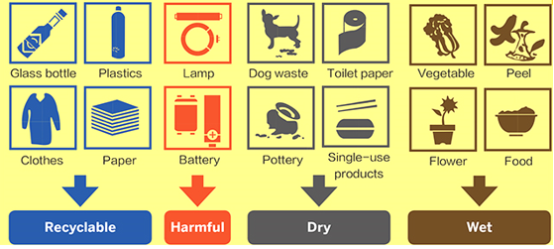
1.Why is the question “Which is the right bin for my garbage?” the most asked one in Shanghai?
A.Because Shanghai has the most garbage in China.
B.Because Shanghai started a new garbage-sorting program in 2019.
C.Because people in Shanghai are fond of asking questions.
D.Because people in Shanghai don’t know about garbage.
2.Which of the following is true?
A.Dog waste and paper are wet garbage.
B.Peel and batteries are harmful garbage.
C.Lamp and plastics are recyclable.
D.Clothes and glass bottles are recyclable.
3.If you are confused about how to sort garbage properly, you may ________.
A.Go to China’s high tech companies and ask for help.
B.Take a photo of it and send it to the high-tech company.
C.Open a mini app in WeChat or Alipay and look for answers
D.Buy a robot and ask him to do it for you.
4.According to the writer, the best way to deal with the garbage problem is ________.
A.to make less garbage
B.to sort garbage in a proper way
C.to educate people to know the types of garbage
D.to develop high technology to sort garbage
-
New Way to Recycle
When Shanghai introduced a new garbage-sorting policy in July last year, the city's residents(居民)took some time to get used to it. They joked that every time they took out their garbage, the staff(工作人员)standing by the bins would ask "What kind of garbage are you?"
Starting on May 1, Beijing joined many Chinese cities by introducing a new garbage- sorting policy, People's Daily reported. Residents should sort their garbage into four groups kitchen, recyclable, hazardous(有害的)and other waste.
These groups are represented(代表)by four different colors of trash bins—green, blue, red and grey. Those who fail to sort their trash correctly may face fines of up to 200 yuan, Xinhua reported.
The way Beijing sorts its trash sounds different from others like Shanghai and Qingdao. These cities use for different groups: wet, recyclable, harmful and dry. Although their names are different, the groups are actually the same. Wet garbage in Shanghai is, in fact, kitchen garbage. And dry garbage is the same as other waste. China Daily reported.
To help residents sort their trash correctly, the Beijing government is offering online guidelines. If people don't know how to throw away garbage, they can search for it on the WeChat account Guanchenglish(管城理事) to find out. By searching a key word or taking a photo, people can immediately find out which group their waste belongs to.
1.What do we know from this story?
A.Garbage-sorting started in Beijing on May 1.
B.Garbage-sorting is being carried out nationwide.
C.Beijing's garbage-sorting policy is the same as Shanghai's.
2.Other waste is the same as ________ in Shanghai.
A.dry garbage B.recyclable garbage C.harmful garbage
3.If people don't follow the garbage-sorting policy, ________.
A.they will be forced to learn the policy
B.they won't be allowed to throw trash away
C.they may face fines
4.The last paragraph mainly explains ________.
A.the government's suggestions about garbage-sorting
B.how to help residents sort their garbage
C.problems with Beijing's garbage-sorting policy
5.We can read this article in ________.
A.a story book B.a guide book C.a newspaper
-
If you live in Shanghai, you might have taken a “lesson” in sorting(分类)garbage, as the city introduced new garbage-sorting rule on July 1, 2019.
As China’s first city to carry out this strict rule on garbage sorting and recycling, Shanghai requires its people to sort garbage to four types — recyclable, harmful, dry and wet waste. If people fail to sort their garbage properly, they will be fined up to 200 yuan.
Since the rule took effect, the amount of total daily waste in Shanghai has been reduced by an average of 15,500 tons, dropping 26 percent from the end of 2018, while the average daily weight of recyclables hits 4,500 tons, five times higher than the end of 2018, according to the Shanghai Landscaping and City Appearance Administrative Bureau(管理局).
The city also rebuilt 21,000 waste-sorting stations and more than 40,000 waste bins have been updated(更新). The city’s waste collection and transportation system is complete, according to the bureau.
“Proper waste sorting protects the environment and saves natural resources,” said Deng Jianping, director of the bureau. “Led by the central government, Shanghai is making efforts to develop long-term solutions to garbage management.”
However, there have also been some problems. Some people complained that it is difficult to deal with wet garbage, as they are asked to remove wet garbage from its bag when dropping. According to the sorting rules, the wet garbage must go in the wet waste bin and the bag must go in the dry waste bin.
This waste separation is necessary, as it ensures(确保)that the wet garbage will decompose(分解)properly and become useful organic waste, the bureau said.
Plastic bags can affect this process. Some people in Shanghai are instead using paper bags that can biodegrade(生物降解)or plastic bags that can be washed and reused, according to Xinhua.
1.People in Shanghai are asked to sort their garbage into the ______ types.
A.recyclable, dry, harmful and kitchen waste
B.recyclable, kitchen, dry and other “waste”
C.harmful, recyclable, dry and “other” waste
D.harmful, recyclable, dry and wet waste
2.According to Deng Jianping, Shanghai ______.
A.has added more than 40,000 waste bins
B.has had problems with garbage management
C.will help other cities make garbage- sorting rules
D.is still looking for long- term solutions to deal with garbage
3.What does “this process” in the last paragraph refer to?
A.The process of sorting garbage.
B.The process of dropping wet waste.
C.The process of decomposing wet waste.
D.The separation of wet waste and dry waste.
4.What does this article mainly tell us?
A.Why Shanghai must sort their garbage.
B.How Shanghai sorts their garbage.
C.The reason of the garbage- sorting rule and some achievements.
D.How to protect our environment.
-
When throwing away rubbish,do you know which bin it should go into? Have you ever noticed the differently-colored bins on the street.
Some of you might not be able to answer this question. However, it's quite important to know how to sort(分类)your waste. Not knowing how to sort waste can make it harder to save energy and protect the environment. If you don't sort your waste, all of it will go to a landfill and be buried( 埋葬)together. These landfills can take up large areas of ground that could be used for planting trees.The electronic waste you throw away, such as batteries(电池), can pollute the land and groundwater. Other piece of rubbish, like the metal part of a pen, can be used to make into other things if they are properly recycled(循环利用).
With this in mind, our school is now asking every student to form a habit of sorting the waste. Here in our school yard we lay four different colors of rubbish bins for different kinds of rubbish. The red is for harmful waste which includes things like medicine, batteries and so on. The blue is for waste like paper, metal, glass and other things that can be recycled. The green is for kitchen waste which is known as wet waste, such as food and soup left after having meals. The yellow is for other dry waste like plastic bags. Dry waste is not wet, recyclable or harmful.
Now that you know this, perhaps you can do your part to protect the environment and encourage others to sort their waste.
1.A landfill is a place________.
A.to plant trees B.to bury waste C.to save enery D.to sort waste
2.Paragraph 2 mainly tells us________.
A.the importance of sorting waste B.the use of batteries
C.the ways of burying wasle D.the value of landfills
3.Which bin should glass be put in? ________
A.The red bin B.The blue bin. C.The green D.The yellow bin
4.Used plastic bags belong to________.
A.wet waste B.recyclable waste C.dry waste D.electronic waste
5.What is the purpose(目的)to the passage? ________
A.To ask people to recycle waste. B.To introduce differently-colored bins.
C.To tell us the pollution caused by waste. D.To encourage people to sort waste
-
You might not think much about where your garbage goes. But now you might want to know. On July 1, Shanghai introduced a new garbage-sorting policy (垃圾分类政策). People there need to put different kinds of garbage into different bins. Other cities in China will do the same soon.
Garbage sorting is a big problem because there is too much garbage these days. It is bad for our environment. In fact, we can make use of some garbage again. But first, we need to sort it.
For example, if you put an old battery (电池) into the "harmful waste" bin, people can use it to make new batteries. But if you don't, the battery will end up somewhere else. Then, it will pollute the environment.
Garbage sorting and recycling around the world
Germany: There are big machines in supermarkets. You can put bottles in the machines and get money back.
Japan: A truck playing music comes to people's doors to pick up their garbage. There are eight or more kinds of garbage. If you sort any of them wrong, you will get a notice on your door.
Indonesia: People can take buses for free if they give plastic bottles to bus-stations. An hour-long bus ride costs three large bottles.
Four kinds of garbage in Shanghai
Recyclable garbage includes paper, books, plastic items, and glass bottles. Harmful garbage includes lamps, batteries, and other things with harmful chemicals (化学品). Wet garbage usually comes from the kitchen, such as food and vegetables. Dry garbage is anything you cannot put into the other three bins, pens and towels, for example.
1.What can we learn from Paragraph 1?
A.Many countries take Shanghai's garbage-sorting policy.
B.Many other cities in China have garbage-sorting policies.
C.Shanghai is the first city in China to make a garbage-sorting policy.
D.China is the first country in the world to make a garbage-sorting policy.
2.The writer gives the "battery" example to tell us ________.
A.how to sort our garbage B.how important sorting is
C.what harmful waste is D.how difficult sorting is
3.If you ________, you can take a free bus ride in Indonesia.
A.put bottles in a machine B.take plastic bottles to the station
C.get a notice on, the door D.put garbage into different bins
4.Which bin should "newspapers" go to?
A.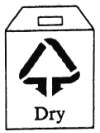 B.
B.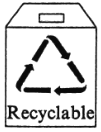 C.
C.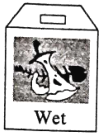 D.
D.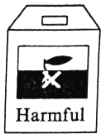
5.Which is the best title for the passage?
A.Sort Garbage, Save Earth B.Less Garbage, Cleaner Environment
C.Clean Shanghai, Beautiful China D.Different Countries, Different Policies
-
If you live in Shanghai, you might have taken a "lesson" in sorting (分类) garbage, as the city introduced new garbage-sorting regulations (规章) on July 1, 2019.
As China's first city to carry out strict regulations on garbage sorting and recycling, Shanghai requires its residents (居民) to sort garbage into four categories (类别), namely recyclable, harmful, dry and wet waste. If people fail to sort their garbage properly, they can be fined up to 200 yuan.
Since the regulation took effect, the amount of total daily waste in Shanghai has been reduced by an average of 15,500 tons, dropping 26 percent from the end of 2018, while the average daily weight of recyclables hits 4,500 tons, five times higher than the end of 2018, according to the Shanghai Landscaping and City Appearance Administrative Bureau.
The city also rebuilt 21,000 waste-sorting stations and more than 40,000 waste bins have been updated (更新). The city's waste collection and transportation system (运输系统) is complete, according to the bureau.
"Proper waste sorting protects the environment and saves natural resources," said Deng Jianping, director of the bureau. "Led by the central government, Shanghai is making efforts to develop long-term solutions to garbage management."
However, there have also been some problems. Some people complained that it is difficult to deal with wet garbage, as they are asked to remove wet garbage from its bag when dumping (倾倒). According to the sorting rules, the wet garbage must go in the wet waste bin and the bag must go in the dry waste bin.
This separation is necessary, as it ensures that the wet garbage will decompose (分解) properly and become useful organic (有机的) waste, the bureau said.
Plastic bags can affect this process. Some people in Shanghai are instead using paper bags that can biodegrade (生物降解) or plastic containers that can be washed and reused, according to Xinhua.
1.People in Shanghai are asked to sort their garbage into the _________ categories.
A.recyclable, dry, harmful and kitchen waste
B.recyclable, kitchen, dry and "other" waste
C.harmful, recyclable, dry and "other" waste
D.harmful, recyclable, dry and wet waste
2.What does the third paragraph tell us?
A.The garbage-sorting regulation has already brought improvements.
B.Recyclable waste comes out to two-thirds of the total daily waste.
C.In 2019, people produced less waste than in 2018.
D.Shanghai needs stricter rules to deal with waste.
3.According to Deng Jianping, Shanghai __________.
A.has added more than 40,000 waste bins
B.has had problems with garbage management
C.will help other cities make garbage-sorting regulations
D.is still looking for long-term solutions to deal with garbage
4.This article tells us __________.
A.why Shanghai must sort their garbage
B.some achievement of the garbage-sorting regulation in Shanghai.
C.the reason of the garbage-sorting regulation and some achievement
D.how to protect our environment
-
If you live in Shanghai, you might have taken a "lesson" in sorting(分类)garbage, as the city introduced new garbage-sorting regulations(规章)on July 1, 2019.
As China' s first city to carry out strict regulations on garbage sorting and recycling, Shanghai requires its residents(居民) to sort garbage into four categories(类别), namely recyclable, harmful, dry and wet waste. If people fail to sort their garbage properly, they can be fined up to 200 yuan.
Since the regulation took effect, the amount of total daily waste in Shanghai has been reduced by an average of 15, 500 tons, dropping 26 percent from the end of 2018, while the average daily weight of recyclables hits 4, 500 tons, five times higher than the end of 2018, according to the Shanghai Landscaping and City Appearance Administrative Bureau.
The city also rebuilt 21, 000 waste-sorting stations and more than 40, 000 waste bins have been dated(更新). The city's waste collection and transportation system is complete, according to the bureau.
"Proper waste sorting protects the environment and saves natural resources, " said Deng Jianping, director of the bureau. "Led by the central government, Shanghai is making efforts to develop long-term solutions to garbage management. "
However, there have also been some problems. Some people complained that it is difficult to deal with wet garbage, as they are asked to remove wet garbage from its bag when dumping(倾倒).
According to the sorting rules, the wet garbage must go in the wet waste bin and the bag must go in the dry waste bin.
This separation is necessary, as it ensures that the wet garbage will decompose(分解)properly and become useful organic(有机的)waste, the bureau said.
Plastic bags can affect this process. Some people in Shanghai are instead using paper bags that can biodegrade(生物降解)or plastic containers that can be washed and reused, according to Xinhua.
1.People in Shanghai are asked to sort their garbage into the ___________categories.
A.harmful, recyclable, dry and wet waste
B.recyclable, dry, harmful and kitchen waste
C.recyclable, kitchen, dry and "other" waste
D.harmful, recyclable, dry and "other" waste
2.What does the third paragraph tell us?
A.The garbage-sorting regulation has already brought improvements.
B.Recyclable waste comes out to two-thirds of the total daily waste.
C.In 2019, people produced less waste than in 2018.
D.Shanghai needs stricter rules to deal with waste.
3.According to Deng Jianping, Shanghai ______________________.
A.has added more than 40, 000 waste bins
B.will help other cities make garbage-sorting regulations
C.has had problems with garbage management
D.is still looking for long-term solutions to deal with garbage
4.What does "this process" in the last paragraph refer to?
A.The process of sorting garbage.
B.The process of dumping wet waste.
C.The process of decomposing wet waste.
D.The separation of wet waste and dry waste.
5.This article tell us _____________________.
A.why Shanghai must sort their garbage.
B.the reason of the garbage-sorting regulation and some achievements.
C.how Shanghai sorts their garbage
D.how to protect our environment
-
为帮助家长选择对孩子有益的网络爱好,Ley正在整理以 “ Some tips to find a suitable online hobby”为主题的文章,请你帮忙从以下选项中选出各段落的主题句。
Finding an online hobby is popular now. So how do parents make the decision of choosing one suitable online hobby for the children? Here are some tips that may help
1. Using the computer for too long may be harmful to your child’s eyesight or may develop into one bad habit. It is important to set rules about how long your child is allowed to stay online and which websites your child is allowed to visit.
2. Why do you want your child to find an online hobby? Do you want your child to learn something educational or maybe you just want him/her to have some fun?
3. Do you know what things your child is interested in? Find one website about his interest. If he likes writing, make a blog for him to write stories.
4. Will this hobby be harmful to my child in any way? How could this hobby help my child? These questions must be considered first
5. After considering all these above, now you can choose which hobby to introduce to your child. List some good websites that you think will be suitable and enjoyable for your child.
A. Choose one hobby
B. Find your purpose
C. Set strict rules
D. Think first
E. Know your child well
-

If you live in Shanghai, you might have taken a "lesson" on garbage sorting(垃圾分类), Shanghai is the first city to carry out(实施)strict rules on garbage sorting. People in Shanghai know that garbage is sorted into four categories(类别)—recyclable, harmful, dry and wet waste. If people fail to sort their garbage properly, they can be fined up to 200 yuan, while companies will have to pay between 1,000 to 50,000 yuan for breaking the rules. Since the rules took effect, the amount of total daily waste in Shanghai has been reduced. The city also rebuilt 21,000 waste-sorting stations and more than 40,000 waste bins have been updated.
However, there have also been some problems. Some people complained that it is difficult to deal with wet garbage, as they are asked to remove wet garbage from its bag when dumping. According to the sorting rules, the wet garbage must go in the wet waste bin and the bag must go in the dry waste bin. Because the wet garbage will decompose(分解)properly ad become useful organic(有机的)waste.
By the end of 2020, garbage-sorting systems will be set up in 46 cities in our country. Everyone should take an active part in garbage sorting.
1.________ is the first city to carry out strict rules on garbage sorting.
A.Beijing B.Shanghai C.Shenzhen D.Chongqing
2.Garbage sorting includes four categories—recyclable, ________, dry and wet waste.
A.harmful B.useful C.helpful D.colorful
3.The underlined word "fined" means "________"in Chinese.
A.责备 B.奖励 C.罚款 D.提高
4._______, garbage-sorting systems will be set up in 46 cities around the country.
A.In 2021 B.By the end of 2020 C.Since 2020 D.At the beginning of 2020
5.According to the passage, we can learn that garbage sorting is ________.
A.awful B.relaxing C.painful D.necessary

 B.
B. C.
C. D.
D.
